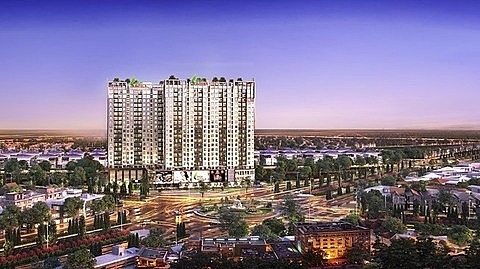Developers look to foreign investors
 |
| Amid narrowing credit sources and rising lending interest rates, property developers have been diversifying their capital mobilisation channels, including calling for foreign investment. – Photo cafef.vn |
In the first half of 2018, real estate ranked second in attracting foreign direct investment (FDI) when it received US$5.54 billion, accounting for 27.3 per cent of total investment registered for this sector.
Troy Griffiths, Deputy Managing Director of Savills Viet Nam, said stable macro-economic development has fuelled the domestic market’s growth and strongly attracted FDI.
It is a relatively favourable start for 2018 with promising movements in all real estate segments.
In the stock market, while the benchmark VN-Index on the Ho Chi Minh Stock Exchange has become stagnant recently, some particularly big investments have still been poured into property projects in the near future.
Good governance, improved accounting standard systems and a stable stock market have all helped persuade foreign investors to buy property stocks, he noted, adding that high profitability is also a magnet drawing investors to the Vietnamese market, compared to other markets in the region.
Real estate developers have been stepping up restructuring, aligning their strategies with the market, and investing in projects with favourable locations and transport infrastructure. They are strongly switching their focus to the affordable segment with prices matching the market demand.
Meanwhile, mergers and acquisitions (M&As) are also vibrant in the property sector. FDI poured into the market mainly comes from Japan, South Korea, Singapore, Hong Kong, Taiwan, the US, and recently, mainland China.
Le Hoang Chau, chairman of the HCM City Real Estate Association, said FDI capital, one of the indicators of Viet Nam’s economy, had been on the rise in recent years. Real estate often ranked third in FDI attraction, adding an important source of capital for businesses when commercial banks are tightening loans for property projects.
Griffiths said real estate was also attracting domestic investors who want to pour money into housing projects. Additionally, in a period when Viet Nam’s tourism is recording spectacular developments, leisure property and hotel projects will continue to have chances to receive more investment.
In the first six months of 2017, the real estate sector ranked fifth in terms of attracting FDI, with a total capital of $1.1 billion.
What the stars mean:
★ Poor ★ ★ Promising ★★★ Good ★★★★ Very good ★★★★★ Exceptional
Related Contents
Latest News
More News
- NAB Innovation Centre underscores Vietnam’s appeal for tech investment (January 30, 2026 | 11:16)
- Vietnam moves towards market-based fuel management with E10 rollout (January 30, 2026 | 11:10)
- Vietnam startup funding enters a period of capital reset (January 30, 2026 | 11:06)
- Vietnam strengthens public debt management with World Bank and IMF (January 30, 2026 | 11:00)
- PM inspects APEC 2027 project progress in An Giang province (January 29, 2026 | 09:00)
- Vietnam among the world’s top 15 trading nations (January 28, 2026 | 17:12)
- Vietnam accelerates preparations for arbitration centre linked to new financial hub (January 28, 2026 | 17:09)
- Vietnam's IPO market on recovery trajectory (January 28, 2026 | 17:04)
- Digital economy takes centre stage in Vietnam’s new growth model (January 28, 2026 | 11:43)
- EU Council president to visit Vietnam amid partnership upgrade (January 28, 2026 | 11:00)

 Tag:
Tag:




















 Mobile Version
Mobile Version